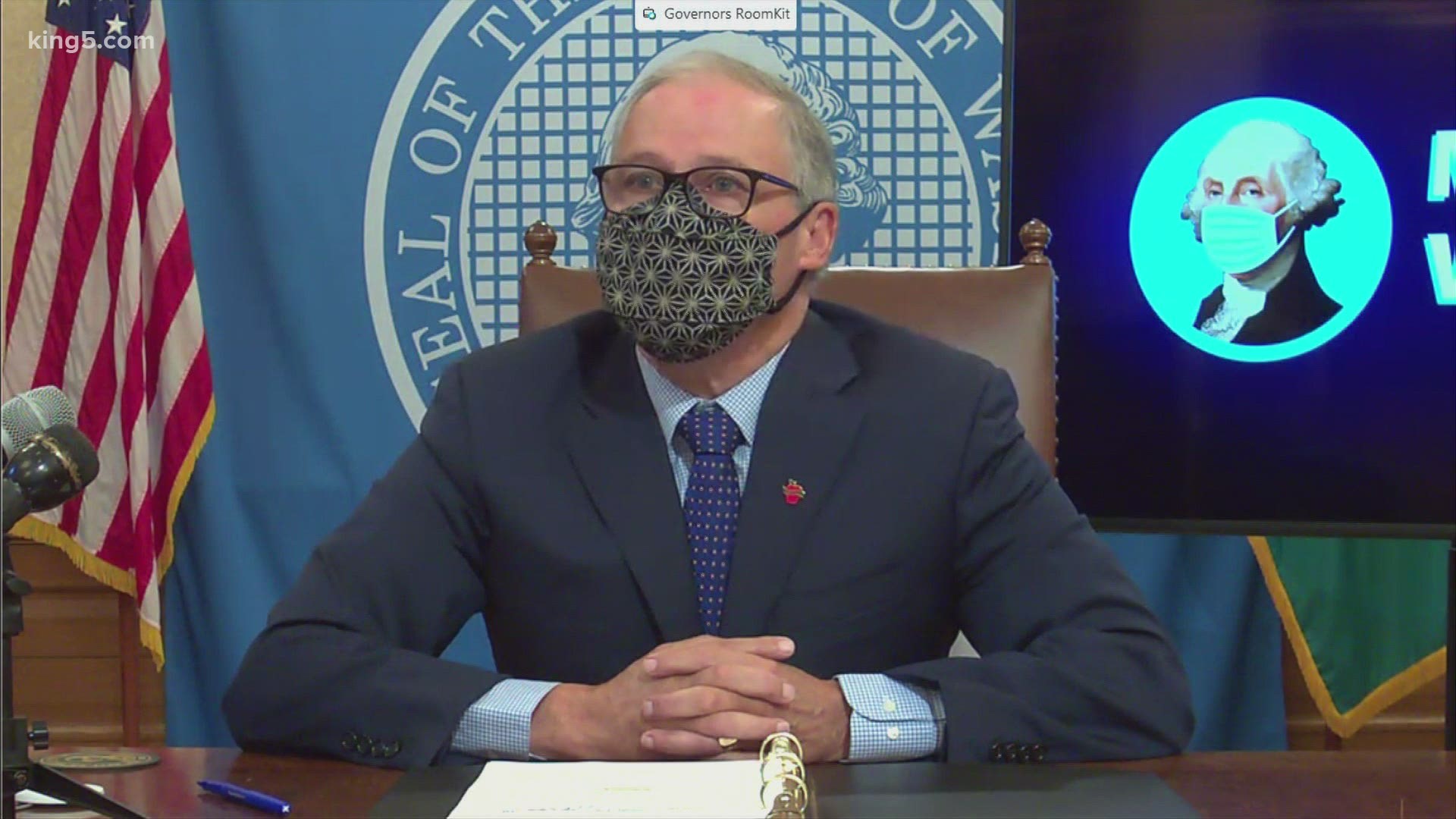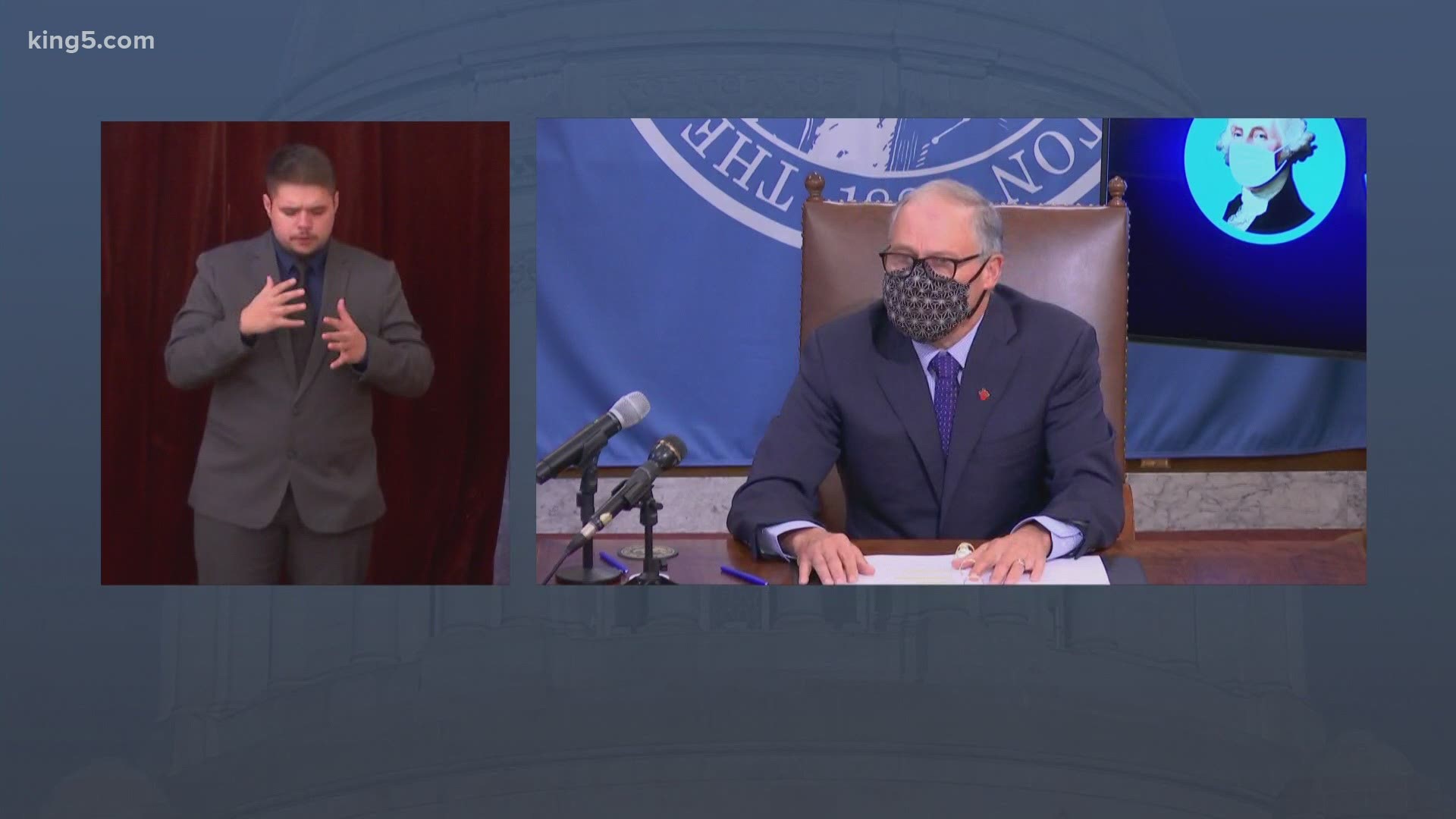OLYMPIA, Wash. — Citing a high number of COVID-19 cases and hospitalized patients, Washington Governor Jay Inslee extended the state's current restrictions on indoor dining, gyms and several other industries until Jan. 4, 2021.
The restrictions had been set to expire Dec. 14.
According to state data, Washington COVID-19 cases spiked in November, and the number of hospitalized patients continues to rise in December.
Health officials recently warned hospitalizations are increasing across the state. Statewide coronavirus data shows more than 11,000 hospitalizations. King, Snohomish, and Pierce counties are among those where hospitalization numbers have been the highest.
According to the state, 80% of ICU beds are occupied. Nearly 1,000 Washingtonians were in ICU beds Tuesday.
The number of hospitalizations are predicted to continue to rise through December.
Responding to record-breaking levels of COVID-19 spread in the state, Inslee announced the most severe restrictions on activity in mid-November since his Stay Home, Stay Healthy order was originally issued in March.
The fundamental difference: In March, nearly all communal activities were banned outright. More activities are allowed now, just with strict limitations on where and how.
Here's a list of some of the biggest restrictions:
- Eating at restaurants is allowed, but only outdoors and with no more than 5 people at a table.
- You can attend fitness classes if they're outside and socially distant.
- Some types of social gatherings are OK this time. You can be outdoors with no more than five people. You can even be indoors if everyone quarantines two weeks beforehand or one week if they get tested and it comes back negative.
- Elective surgery is not banned.
- Construction is not banned.
- School districts have flexibility to allow some in-person learning, if the local health officer permits it based on local COVID data.
- While movie theaters are closed, as they were in the first lockdown, this time there's an exception for drive-ins.
- Retail stores can be open, unlike last time when only grocery stores and other essential services were allowed. The stores just have to make sure they don't go over 25 percent capacity.
- Personal services, like barbers and hair salons, can stay open now, but they too must keep it to 25 percent capacity.
- Weddings and funerals are OK this time with up to 30 people, though receptions are once again banned.
- Church services are allowed at 25 percent capacity as long as that means no more than 200 people.
- Most teams sports are once again banned, however this time there's an exception for pro and college teams that follow rigorous protocols.
The state's travel advisory remains in place for all non-essential travel. The advisory issued Nov. 13 doesn't have an end date.
Inslee is also allocating $50 million in economic support for businesses and safeguards for workers impacted by the pandemic. The money is in addition to the millions in relief announced when the restrictions were put in place.
Washington CARES Act spending so far includes:
- $120 million for rental assistance
- $69 million for food assistance
- $15 million for energy bills
- $164 million for child care
- $510 million for local governments
Anthony Anton, President and CEO of the Washington Hospitality Association, said the ban on indoor bar and restaurant service "does not need to be done."
He said if indoor dining was to blame for an increase in cases, the number of positive cases would have dropped since the ban was put into place last month.
Anton said the move could put thousands of employees out of work and hundreds of restaurants out of business heading into what is supposed to be a busy holiday season.
"I'm beyond frustrated. I'm beyond angry," said Anton.
Anton and Inslee agreed on one thing: the state needs Congress to come up with federal assistance for those impacted by the pandemic.


